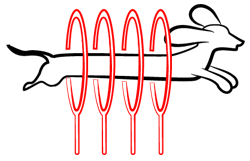
Paws ‘N’ Pups Quickview
Size
| Energy Level
| Trainability
| Paws ‘N’ Pups Rank
|
Characteristics
| Physical Characteristics: Height: 8-10” Weight: 5-15 lbs. Energy Level: Moderate | Colors: The Pomapoo is found in the following colors:
|
Health & Longevity
Average Life Span: 12-16 years
The Pomapoo is a hybrid mix of a Toy Poodle and a Pomeranian, meaning he is less likely to be prone to hereditary health problems. However, he can experience health issues that affect either parent breed.
Patellar luxation, common to small dog breeds, may impact the Pomapoo. Patellar luxation is when the knee joint slides easily in and out of place. This dislocation of the knee results in discomfort, pain, and, in severe cases, arthritis or lameness. The condition is degenerative, and surgery may be needed in serious circumstances. Hip dysplasia is another joint issue that Pomapoos may experience, and it occurs when a malformed hip joint results in the thighbone not fitting correctly in place. This condition can lead to arthritis or lameness in severe cases as well, and surgery may be required. Although it is hereditary, hip dysplasia can be triggered by rapid weight gain or injury. Dogs with hip dysplasia should not be bred, so ensure your puppy’s parents have no history of the condition.
Tracheal collapse may occur in some Pomapoos. Tracheal collapse is the result of rings of cartilage within the trachea (or windpipe) collapsing, leading to obstruction of the airway. Dogs with a collapsing trachea should present symptoms like a honking cough, labored breathing, blueish gums, and exercise intolerance. There is no curative treatment for tracheal collapse, but treatment can include antibiotics and cough suppressants. Exercise and weight loss may help reduce the problem in overweight dogs.
The Pomapoo may also experience cataracts, allergies, and epilepsy. Additionally, his eyes may produce an excessive discharge, which can lead to staining of the fur around the eyes.
The Pomapoo is a healthy breed overall, with an average lifespan of 12-16 years.
Temperament & Train-ability
Although the Pomapoo can possess any combination of characteristics common to the parent breeds, the average Pomapoo is friendly, sweet, affectionate, and loving. He is typically energetic and social, and he loves spending time with his family. He forms very strong bonds with his people and is not a good choice for a family that will need to work or travel without the dog often.
The Pomapoo can thrive in an apartment because his exercise needs are fairly easy to meet. Most of his daily exercise needs can be met with playtime, but at least one longer walk each day is recommended. Play games with the Pomapoo and allow him to frolic throughout the house, and he should be happy and well-adjusted. This breed can spend time outside, but should live indoors and should not be kenneled. They love companionship and want to spend as much time around their people as possible. Pomapoos can be good watch dogs who will bark to warn their owners of danger. Otherwise, he does bark occasionally. The Pomapoo is happiest in moderate climates rather than extremes. If your Pomapoo will be in cold weather, a dog sweater is recommended. For hot weather, keep your Pomapoo indoors around a fan or air conditioning.
Pomapoos are excellent with children. However, because of their size and fragility, supervise young children to ensure that they treat the tiny dog gently. They typically get along well with other dogs, but early socialization is needed. Like the Pomeranian, the Pomapoo may be reserved around strangers. Socialization can ensure that he does not become fearful, shy, or timid.
The Pomapoo responds very well to training if you start early. He is intelligent and learns quickly. However, if you wait too long to begin training, they can become willful and stubborn. Keep training sessions short, upbeat, and varied to hold his attention. Use positive reinforcement techniques like verbal praise, favorite treats, and extra playtime. Be firm and consistent in conveying your rules and expectations.
Grooming
Like most mixed breeds, the Pomapoo’s coat can vary. It can be straight, wavy, or curly. In any case, brush at least weekly to prevent matting. The amount of hair the Pomapoo sheds can also vary, but all Pomapoos will shed at least minimally.
The Pomapoo may also need professional grooming every 4-6 weeks to keep his coat looking its best. No dog breed can be guaranteed hypoallergenic, but the Pomapoo can be a good fit for dog lovers with allergies.
Bathe the Pomapoo as needed. Wash his face daily, paying special attention to the fur surrounding the eyes, as this area can become stained easily. Trim his nails as needed. Be sure that his nails do not touch the floor, as this length can be uncomfortable for the Pomapoo. Brush his teeth 2-3 times weekly to prevent bad breath and maintain healthy gums. Daily brushing is even better for a Pomapoo, who can be especially prone to dental problems. Lastly, check his ears for signs of infection like redness, tenderness, and odor regularly.
Diet
Your Pomapoo should eat 1-1.5 cups of high-quality dry dog food that is designed to meet the needs of smaller breeds daily. The ideal type and amount of food for your individual Pomapoo will vary according to factors like weight, build, metabolism, activity level, and age.
It is best to divide the Pomapoo’s feeding into three or more small meals each day. Also ensure that he has access to clean, fresh water at all times, especially in hot weather.
Looking for a Pomapoo?
 Find A Pomapoo Breeder |  Pomapoo Puppies For Sale |  Adopt A Pomapoo |
Cost
The cost of a Pomapoo can vary widely, ranging from $400-$1,800. Price is impacted by variables like breeder location, pedigree, and gender.
Paws ‘N’ Pups Ranking
Paws ‘N’ Pups ranks every breed out of 4 with 1 being easiest to integrate into your life and 4 being the toughest – The lower the ranking the better.
Ranking takes into account a few basic factors including cost, skill level needed, high vs low maintenance and how critical regular training is to success. The Pomapoo ranks a 2. He is friendly and gets along well with most dogs and animals, he is very healthy, and he can adapt quickly to apartment living. However, he does best in moderate climates, may require professional grooming on occasion, and cannot be left alone for extended periods of time. He can be easy to train, but it is recommended to begin training and socializing from a young age for best results.
Breeds Similar To Pomapoo
 Pomeranian |  Poodle |  Japanese Chin |  Bichon Frise |




